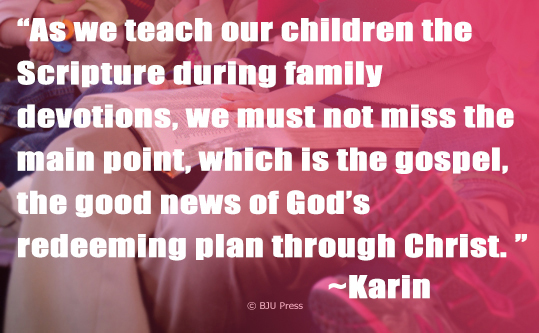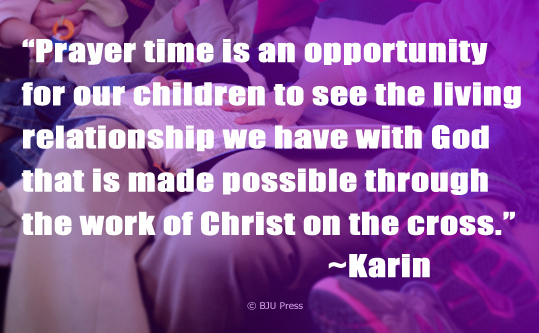As we teach our children the Scripture during family devotions, we must not miss the main point, which is the gospel, the good news of God’s redeeming plan through Christ. The Bible isn’t merely a book of character-building stories to orient a child’s moral compass; rather, it uncovers our spiritual bankruptcy before a holy God and reveals our wonderful Savior and Lord Jesus Christ.
While the gospel is central, there’s a reason the Bible isn’t a four-point salvation presentation in tract form. We ought not to ignore any of God-breathed Scripture, all of which is “profitable for teaching, for reproof, for correction, and for training in righteousness, that the man of God may be competent, equipped for every good work” (2 Timothy 3:16–17, ESV). Even the genealogies, long and tedious as they can be, show the authenticity of the Bible’s history and the faithfulness of God in preserving the line of Christ.
Law, history, poetry, and prophecy in the Old Testament also serve a purpose.
Law
Passages on the law of God point our children to God’s perfection, our inability to meet God’s righteous demands, and the Lamb of God, who perfectly fulfilled the law and shed His blood for our sin “that we might be justified by faith” (Galatians 3:24 NKJV). God gives new hearts so believers have the power to obey the imperatives given in the New Testament (1 John 2:3–4, 3:9).
History
The historical books in the Bible dramatically tell our children the story line of redemption, as each character and every event bring us closer to the climax of Christ’s coming. The New Testament writers demonstrated how the Old Testament characters showed our need for Jesus and salvation by faith:
- Adam and Eve: Romans 5:12–21
- Cain and Abel: Hebrews 11:4
- Noah: Hebrews 11:7
- Abraham: Galatians 3
- Moses: Romans 10:5–10
- David: Acts 2:25–36
Poetry
The Bible’s unsurpassed poetry reveals God’s character and works. The worshipful psalms and instructive proverbs teach our children the fear of the Lord, which is the beginning of wisdom (Psalm 111:10). Such reverence should drive them to be reconciled with God through the cross. On the cross, the sinless Christ bore our sin and then rose from the dead in victory over sin and death, granting eternal life to all who turn to Him in repentance and faith.
Prophecy
Reading the books of prophecy with our children reveals man’s stony heart and need for God to give a heart of flesh (Ezekiel 36:26). This regeneration was made possible through the perfect life, death, and resurrection of the Messiah. Detailed prophecies pinpointed the person and work of Christ, hundreds of years before He fulfilled them.
As we engage our children in family devotions, we must remember that our children aren’t born with neutral hard drives that simply need to be programmed with the right software. They’re born with the deadly virus of a sin nature passed on from our first father Adam. That’s why Jesus said we must be born again (John 3:3–8).
We can’t cause this change of heart in our children, so that they repent and believe in the Lord Jesus. But we can be faithful to pray for them and teach them through family devotions, so that they when they’re grown, we can remind them of their biblical heritage (2 Timothy 3:14–15).
May the Lord grant us grace in the task of family discipleship. What a privilege we parents have to lead our little ones to the Savior!




